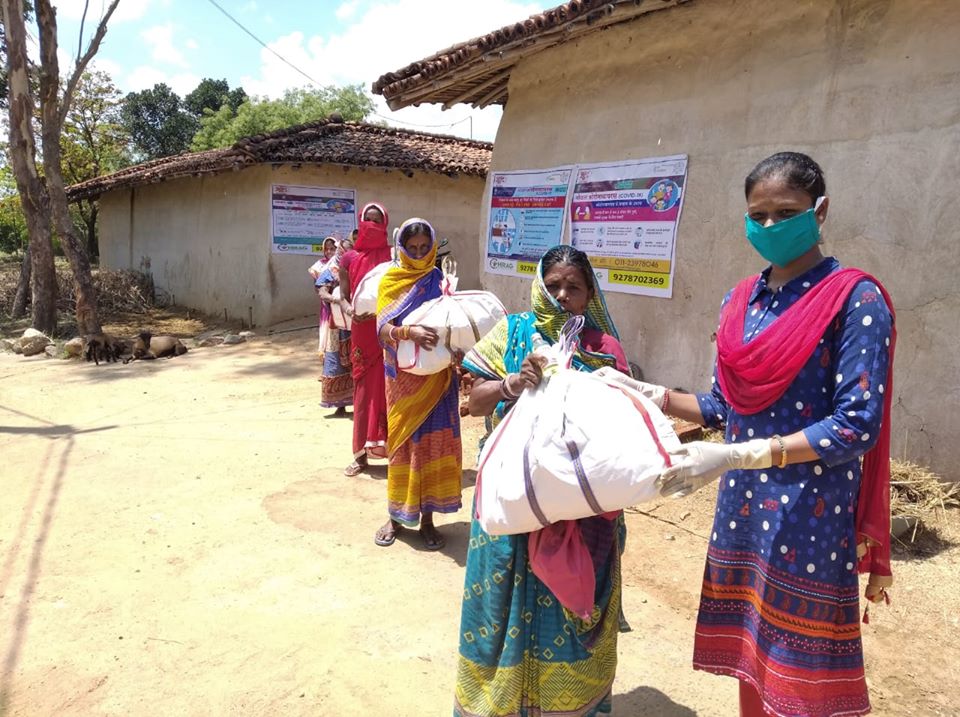
Delivery of dry ration kits to beneficiaries in Bihar/ photo credit: PRADAN
Non-governmental organizations (NGOs) and members of civil society in India have stepped up their efforts to complement governmental COVID-19 relief measures. The case of Professional Assistance for Development Action (PRADAN), one such NGO, stands out as it reimagines the role of its large network of self-help group members to cater to the changing needs of communities. In this blog, Kalyani Raghunathan and Avijit Choudhury describe PRADAN’s commendable efforts in raising awareness about COVID, facilitating linkages between social protection programs and their beneficiaries, and providing monetary and instrumental support to uplift small and marginal farmers. Rasmi Avula, series co-editor and Research Fellow, Poverty, Health, and Nutrition Division (PHND)
India has slowly started opening up its economy, following a series of lockdowns that lasted from March 24 to June 1. At this point, as with several other developing countries, we are caught between the dual objectives of saving lives and protecting livelihoods.
The lockdowns disproportionately affected the already marginalized – daily wage earners, unorganized workers and agricultural labourers. Soon after the first lockdown came into effect, the central government announced a slew of measures to provide cash and in-kind relief to the vulnerable. These measures were criticized by some as being inadequate and skewed towards the rural poor, especially ignoring migrant laborers from the urban informal sector. However, with large-scale reverse migration post-lockdown, rural areas are under a growing strain as well. Households find themselves with more mouths to feed at precisely the time when incomes are low. Rabi prices were depressed as markets remained closed and families no longer have the buffer of remittance incomes.
Several states have initiated generous relief measures, in addition to those announced by the Centre. Civil societies and non-governmental organizations (NGOs) across the country have stepped in to plug the gaps. One such NGO, Professional Assistance for Development Action (PRADAN), works with more than 0.9 million women, organized into self-help groups (SHGs). With group meetings put temporarily on hold due to social distancing, SHG programs across the country have been put to work on pandemic-specific activities. PRADAN was one of the first movers in this space, and significant lessons can be learnt from their use of local networks to gather information and deliver relief.
What has PRADAN done differently in its communities to manage the crisis and limit the impacts of the pandemic?
First, PRADAN teams set up mechanisms for community surveillance, awareness and other support services in 3,367 villages, one of the largest ventures of its kind in the current scenario (Table 1). Awareness generation campaigns have been conducted in more than 15,000 hamlets, through which the NGO provides information on the virus and advises on preventive measures to be taken to limit chances of infection.
Second, PRADAN has been working to supplement or augment existing social protection schemes, especially those related to nutrition. With the suspension of school meals and supplementary nutrition services under the Integrated Child Development Services scheme (though some states are home-delivering these), and the fall in household income, there is a real danger of worsening food security and nutrition. To combat this, PRADAN has set up more than 300 community kitchens, provided support to individual kitchen gardens, and is encouraging farmers to grow more diverse crops (Table 1). These initiatives can be easily adopted by other State Rural Livelihood Missions (SRLMs), especially since the missions already support agriculture and homestead production.
Finally, PRADAN is instituting several agriculture-focused measures to alleviate the impact of the credit crunch farmers are facing. These include monetary support, mentoring activities, and market-linkages for farmers through an innovative “veggies-on-wheels” model (Table 1). As social distancing norms are likely to continue post-lockdown, PRADAN plans to replace public meetings and in-person trainings with the use of digital technology to provide agriculture trainings and disseminate information.
Table 1: Thematic measures adopted by PRADAN during COVID-19

With generous financial assistance from private donors and philanthropic organizations, these relief measures have already started to reach households. However, more resources are required. Also, PRADAN and several other NGOs, in similar positions, are highlighting that this ‘crisis-mode’ cannot be sustained in the long-term. There is a clear need to invest in the development of areas that are away from urban centres and can no longer reliably deliver growth and employment opportunities, especially with rapidly rising nation-wide unemployment and a heightened understanding of the precarities of urban informal work. With migrants likely to be reluctant to return to cities, there must be a mechanism to renew rural livelihoods. Fortunately, this is a key component of PRADAN’s and SRLMs’ engagement. One can but hope that once the dust settles on the COVID-19 crisis, we will be able to reimagine our economy along new lines. Until then, the widespread efforts of PRADAN and other organizations to use SHGs and their networks for relief can serve as a valuable reminder on the importance of the work carried out by these grassroots institutions.
This blog was originally published in the website of International Food Policy Research Institute (IFPRI), South Asia here . It is published as part of the blog series on analyzing the impacts of the COVID-19’s pandemic on the sub-national, national, and regional food and nutrition security, poverty, and development.
Kalyani Raghunathan is a Research Fellow, IFPRI’s Poverty, Health and Nutrition Division (PHND). Avijit Choudhury is an Integrator (Resource Mobilization, Partnerships and Communications) and a member of the Management Unit at PRADAN. The opinions expressed in this piece are solely those of the authors.